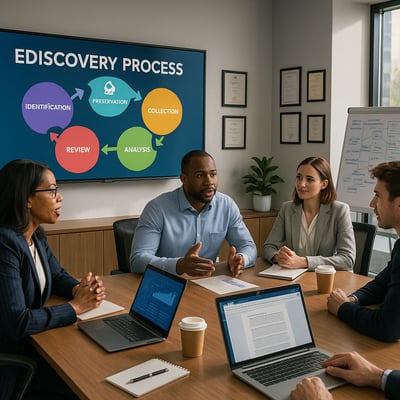" Cut Through the Digital Clutter: Why eDiscovery Is No Longer Optional \n In today’s legal...

A single person can only do so much. Time, and our own physical and mental limitations, keep any one of us from being able to do everything that needs to be done.
That’s why law firms evolved from solo practitioners to sprawling practices with multiple attorneys, staff, and administrators. Still, even the biggest firms often rely on outside support to meet challenges that exceed what they can meet with their current resources. When it comes to large document productions and investigations those needs are typically large, pressing and specialized. You need to sort through massive numbers of documents quickly and produce accurate and relevant results. And you need it done yesterday.
This is where an experienced vendor like Array can help. The specific expertise and flexible resources of Array can help you deliver timely, accurate review and production results so you can focus on the bigger legal picture for your matters.
To understand why, and to learn about the Array advantage for your team, browse these seven essential facts about managed review.
A decade ago, William W. Belt, Dennis R. Kiker and Daryl E. Shetterly outlined the momentous change that had already been transforming the legal field.
Writing in the Richmond Journal of Law and Technology, they described how once upon a time “the documents copied in preparation for production were more likely to contain only the relevant, non-privileged documents.” In other words, in those long-ago days of the 1990s, discovery was a self-limited process, confined to paper or a few computer printouts. Companies likely saved only a limited selection of the paper they produced each day anyway.
“Even if the data set contained other documents, a few lawyers or paralegals could sort through and categorize them efficiently with limited cost,” the authors wrote. “As data volumes grew, so too did the volume of irrelevant documents commingled with the documents collected from the client. Given the large data volumes now collected in many cases, the document review phase (separating the relevant documents from the irrelevant documents, and identifying documents to be withheld or redacted and logged as privileged) of an electronic discovery project is often the most expensive part.”
In other words, discovery and document review meant a specific and limited thing in the past. It no longer means that today. Today’s exponential growth of electronic data makes the task both bigger and more complex. it requires the ability to sort and manipulate data on tight schedules while meeting your and your clients’ budgetary needs.
That change means a handful of internal lawyers or other support staff are often not enough. Sure, they could make their way through a few hundred documents. Maybe even a few thousand. But that model must change when your firm handles gigabytes or terabytes worth of data. The data load you face for any given case might include not only hundreds of thousands of emails, but also video and audio recordings and a swath of irrelevant information that inundates your data set.
In a recent review of legal innovation the American Bar Association noted, “According to IBM, this data creation is gathering speed exponentially, allowing 2.5 billion gigabytes of new data to be generated every day, the majority of which is unstructured. Simply stated, the numbers are massive, and the unorganized nature of data impacts all businesses, including law firms and legal departments.”
When it comes to reviewing the ever-growing mountain of data, it is not a matter of simply hiring additional people. The varied formats mean teams taking on document review must develop new processes and take on the task of training new hires in technology assisted review.
These review tasks are no longer side tasks in a lawyer’s job; they have emerged as an entire industry unto itself. Rather than take on the additional effort and considerable investment that absorbing this expertise and technology would require, firms should consider engaging with a managed review partner. In this type of engagement firms receive the resources and results but also the infrastructure to get there: predefined workflows, experience in project management, quality control, and successful practices.
Within the last few years, the managed review space has shifted along with much of the working world. That is, the COVID-19 pandemic pushed many into doing the job from home. This is particularly true in an area like managed review, in which data is stored on servers that allow secure access via remote desktop systems.
In examining the future of work after the pandemic, McKinsey & Company expects a rise in both remote work and in leveraging developing technologies, especially in jobs that have previously required in-person efforts. Managed Review, previously considered a role that required physical proximity, is now among the industries embracing the at-home revolution.
In the wake of the pandemic, The Great Resignation has sent employers across all industries scrambling to find the right mix of compensation and benefits - including remote work - to help attract and retain employees. The legal industry is no different. Remote work in the managed review space allows vendors like Array to reach out and find the right talent for its review work, no matter where those people live.
Finally, calls to increase profitability require reducing expenses. Managed review providers continue to find more ways to trim expenses for the mutual benefit of themselves and their clients. That ensures that the process will be even more decentralized in the future.
With the growth of remote work, law firms and their clients are rightly concerned about security. 2021 saw a record increase in cybersecurity incidents. As cyber attackers move away from individual scamming, businesses with large amounts of sensitive information will start to draw the attention of cyber threats. Law firms and legal services professionals make an attractive target with loads of privileged information. In addition to the attractive data, firms and service providers are now more decentralized than ever before. Having to manage physical security and human behavior across employees is a new type of challenge because as the numbers continue to increase it is seemingly a question of when, not if, a data breach will occur.
These risks call for a strategic, sustained approach to security. Companies like Array not only understand these risks but invest in the internal infrastructure required to greatly reduce the risk of security breaches. Firms that work with experienced, trusted vendors to both manage and mitigate such risks will have a notable advantage in both resourcing and results over those that do not embrace remote review.
For most discovery work today, the time of reviewing paper files in a folder on your desk has passed. Even if your firm’s lawyers could physically work through all of the data in a timely manner, the cost to end clients would be astronomical. Your managed review process will likely involve an outside vendor who can ease price and staffing pressures, while bringing their own special expertise to the process. The field continues to change and grow, and you need a partner who both understands and is prepared to navigate those changes.
All of these are reasons to get in touch with Array.
Array offers a “full suite of managed review services including first pass review, quality assurance and control, confidentiality and redaction review, and privilege review and privilege log generation,” according to the managed review section of its website. “Approaching each of these with an eye toward defensibility, each service can also be customized to suit a client’s needs or on a project-specific basis.”
No two projects are alike. Array has both a breadth and depth of experience and expertise in planning and supporting clients to deliver the results you need on your project.
Array has stepped up to help “all types of clients, from small companies and law firms unfamiliar with electronic discovery and managed document review to large corporate clients involved in complex, multi-jurisdictional litigation, in a wide range of practice areas.”
Some practice areas in which we have performed significant work are wage and hour, employment, product liability, intellectual property, construction, oil and gas, immigration, pharmaceutical and health care litigation, and Government investigations, at both the state and federal levels. The list will never be exclusive or exhaustive; managed review services can help with any legal area that involves large data sets that you need someone to break down and analyze.
They can provide these services because they understand and execute the systemic and technical layers of managed review. Array’s team understands the kind of advanced workflows, “including structured analytics – email threading and textual near duplicate analysis, conceptual analytics – clustering and categorization, and Technology Assisted Review – predictive coding and continuous active learning.” They work with you to identify the right tools and processes to apply to your situation to help you achieve most effective and efficient results.
We don’t expect you to just take our word for it. In its examination of technology trends earlier this year the American Bar Association made a very similar point.
The data explosion isn’t going to stop. It also appears hiring challenges, the increasing need for legal services, cybersecurity concerns, and technology evolution will impact the industry for several years to come. Rather than looking at challenges, firms can choose to see opportunities. By partnering with a managed review partner to manage the review itself, firms can spend more time interpreting the results and identifying white space. Law firms can move away from data examination and “reclaim their seat and start to seek out opportunities for their firm.”
Having a trusted partner to manage document review can help firms better align their resources and add more value to their clients by spending more time developing and executing legal strategy. As firms look to meet business development and efficiency goals, focusing on the practice of law rather than data management can be a big step toward those goals.
So reach out today to schedule a meeting with us. We would love the opportunity to discuss how Array can meet your needs and goals and become your trusted managed review partner.

" Cut Through the Digital Clutter: Why eDiscovery Is No Longer Optional \n In today’s legal...



Every week, the Array team reviews the latest news and analysis about the evolving field of...